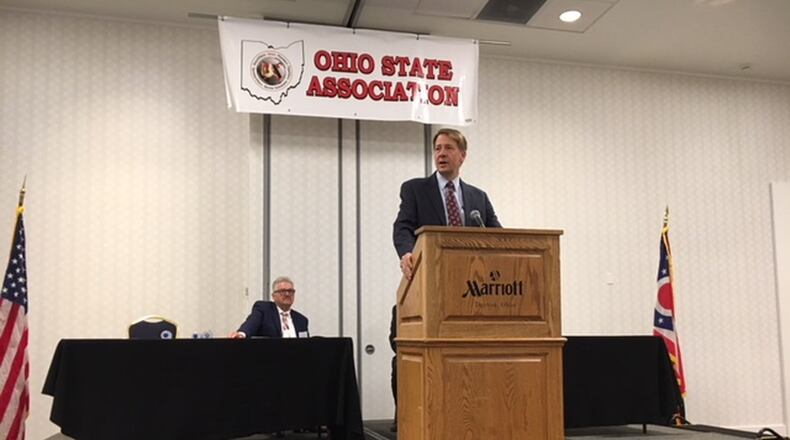He also took aim at an apparent lack of federal progress on infrastructure improvements, saying it will be up to Ohio to address infrastructure needs.
RELATED: Poll says Ohio governor race too close to call between Cordray, DeWine
“We have to flex our muscles … and create that strong infrastructure ourselves,” Cordray said.
States around Ohio are increasingly embracing “right to work,” the common name for laws that make it illegal to force employees to join a union or pay union dues. As of 2017, 28 states had such laws, according to the National Conference of State Legislatures — including Indiana, Michigan and Kentucky.
“It has kind of surrounded us in the Midwest,” Cordray said.
He accused his Republican opponent in the governor’s race, Ohio Attorney General Mike DeWine, of being “squishy” on right-to-work questions, charging DeWine with giving one audience one message and another audience another message.
RELATED: FBI investigation, Trump, may factor into Ohio governor’s race
“You cannot count on him being on your side,” said Cordray, himself a former attorney general.
He insisted that right to work was a “central issue” in the campaign, saying, “Believe me, they have been pushing this in Ohio, as well.”
A spokesman for the DeWine campaign said DeWine has been endorsed by a number of Ohio unions, including the Tri-State Building & Construction Trades Council and others.
“Richard Cordray has been trying desperately to convince voters that he is an inspired and energetic candidate, but having fallen short, he’s just resorted to traveling the state and talking about the only thing he knows has people excited for this November: Mike DeWine,” said the spokesman, Joshua Eck.
Kenneth Vierling Sr. is president of the Ohio Conference of Plasterers and Cement Masons, which endorsed DeWine this year.
“This was not an easy decision for us because he is the very first Republican candidate we have ever endorsed for governor in Ohio, but we believe that Mr. DeWine will best serve the citizens of Ohio and our members,” Vierling said in an email sent by a spokesman. “I am not naive and fully understand that politics is a nasty business, but the misinformation being spread around about Mr. DeWine regarding these issues is not valid in my opinion.”
Ohio voters nearly seven years ago overwhelmingly rejected Senate Bill 5, which would have limited collective bargaining among public-sector unions. More than 60 percent of voters rejected the issue.
Since then, Republicans have been generally wary of right-to-work questions, but early in 2018, two GOP lawmakers proposed creating not legislation, but ballot language — via six proposed constitutional amendments — on the question for a possible November 2020 vote.
RELATED: Dems want to pin ECOT blame on GOP in fall election
“Not on our agenda at all,” the Cleveland Plain Dealer quoted DeWine as saying during a campaign stop in late May when he was asked about the possible ballot initiative.
Cordray also defended “prevailing wage laws” that peg wages and benefits paid on public-sector construction projects to a regional minimum.
He said prevailing wage measures put “skilled workers and the best talent” on construction job sites.
Though Cordray most recently served as the inaugural director of the Consumer Financial Protection Bureau in Washington, D.C., he didn’t mention that role in his address in Dayton.
Asked about that afterwards, the candidate said he feels voters are “appreciative” of his work the CFPB, but that his campaign is about the future.
About the Author

